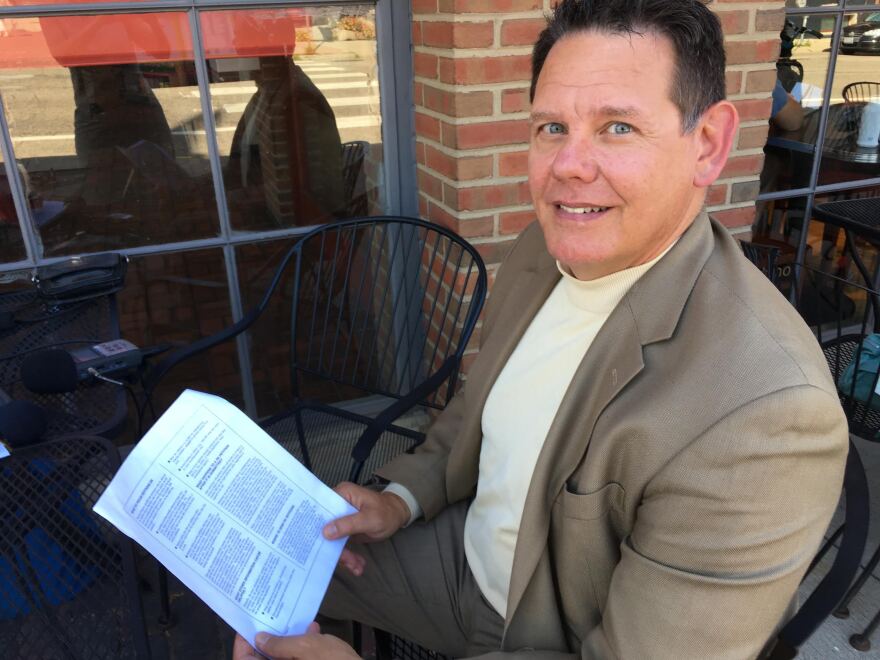Good communication between all parties involved is central to productive conflict resolution. Some say it needs improving when it comes to dealing with Ann Arbor’s dioxane-contaminated groundwater. In this segment of our ongoing series, Barbara Lucas looks at the question: “What part does communication play in how we move forward?”
David Fair (DF): For three decades, Ann Arbor’s clean-up strategy for the expanding 1,4-dioxane plume has been negotiated between the state and the polluter. The judge in the case has barred all others from having a voice in the court proceedings. Should the City of Ann Arbor and Washtenaw County be party to the discussions? That’s the focus of this 17th segment of WEMU’s series in ‘The Green Room.”
Evan Pratt: It’s just a little four-page form.
Barbara Lucas (BL): I’m with Evan Pratt, Washtenaw County Water Resources Commissioner. We’re at a café in Kerrytown, a few blocks northeast of the dioxane plume which is under the city. On August 3rd, the County Board of Commissioners voted to pursue application for Superfund designation.
Pratt: The form is fairly simple.
BL: He reads off the questions.
Pratt: And finally, and this is the key question that the EPA suggested might disqualify us.
BL: Pratt says this one arose in Chicago, back on July 25th, when the city, county, and state met with the Environmental Protection Agency to explore the possibility of applying for Superfund status.
Pratt: The folks from the EPA several times mentioned that the site was not a good candidate because there already was a cleanup in progress, a regulatory authority, there was a responsible party—which means a viable business with money.
BL: He says the EPA informed them Superfund usually is only for orphan sites where the polluter is unknown or bankrupt, but that there have been exceptions.
Pratt: The responsible party—you know, the folks paying for the cleanup—as well as the regulatory agency, would both need to provide something in writing to the EPA that basically says ‘we give up and we want the EPA to take over from us.’
BL: What does the Responsible Party think about the Superfund question? No one is talking to the press. Not Pall Corporation, which inherited the problem when it bought Gelman Sciences in 1997. Nor Danaher, which is now Pall Corporation’s parent company. Neither attend public meetings. The situation is not working for Pratt.
Pratt: So, to date, over the thirty-year history, there’s been a feeling in the area that what’s been mutually acceptable to the DEQ and to the responsible party is NOT acceptable to local units of government. So, in my mind, it is vitally important to be in the room at that negotiation session before a new consent judgment is signed.
BL: A new strategy will have to be mapped out when the state adopts a more protective dioxane level, hopefully within the year.
Pratt: Right now, as we speak, the DEQ and the responsible party—Pall-Gelman-Danaher—they are having some type of meetings that can’t be disclosed because they are confidential.
BL: A few blocks away at his law office, Ann Arbor Mayor Christopher Taylor would also like to see local governments weigh in. He points out these decisions concern not only citizen health, but the city water infrastructure. When wells in the townships get contaminated with dioxane, they must be hooked up to city water.
Mayor Taylor: So it’s very important for all these reasons that we be at the table.
BL: I mention potential costs of getting the city into the litigation.
Taylor: We are in it! There’s no getting away from it. I would love to not be involved in it. We have a plume of a carcinogen underneath the city that is in a place that is a long-term risk for us. We need to address it.
BL: Taylor recently met with Governor Rick Snyder in Lansing to discuss the dioxane situation. He asked the governor to support the city’s participation in the case.
Taylor: He did say that seemed like a reasonable request and he said he would circle up with his legal team and see if that was something he could personally support.
BL: U.S. Congresswoman Debbie Dingell is calling for a meeting of principles to discuss the Superfund question—ideally including the Responsible Party. Will they come out from behind closed doors? And at the same time, will the county and city be allowed to get past those same closed doors, and into court?
BL: Barbara Lucas, 89 One, WEMU News.
DF: “The Green Room” is a presentation of the News Department of 89-1 WEMU. To hear the first 16-installments of our series on the Ann Arbor Area’s 1,4 dioxane plume visit the “Green Room” archive at wemu-dot-org. I’m David Fair and this is 89-1 WEMU.
RESOURCES:
![]()



